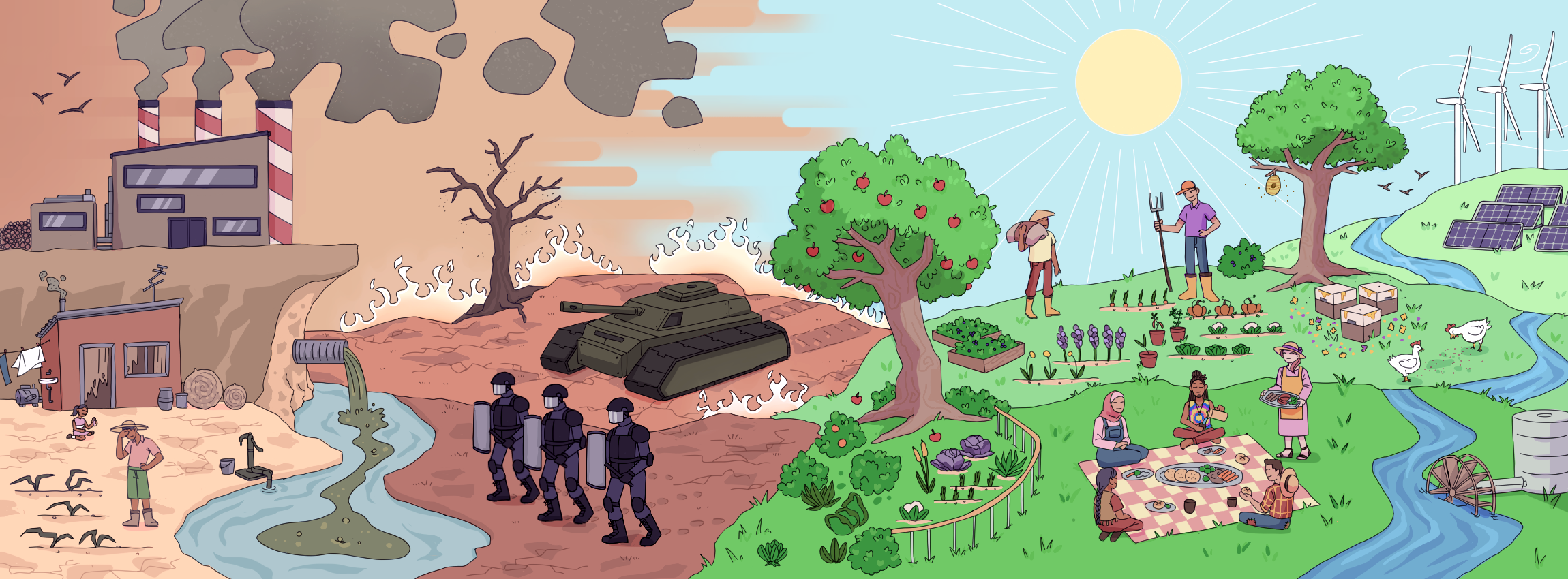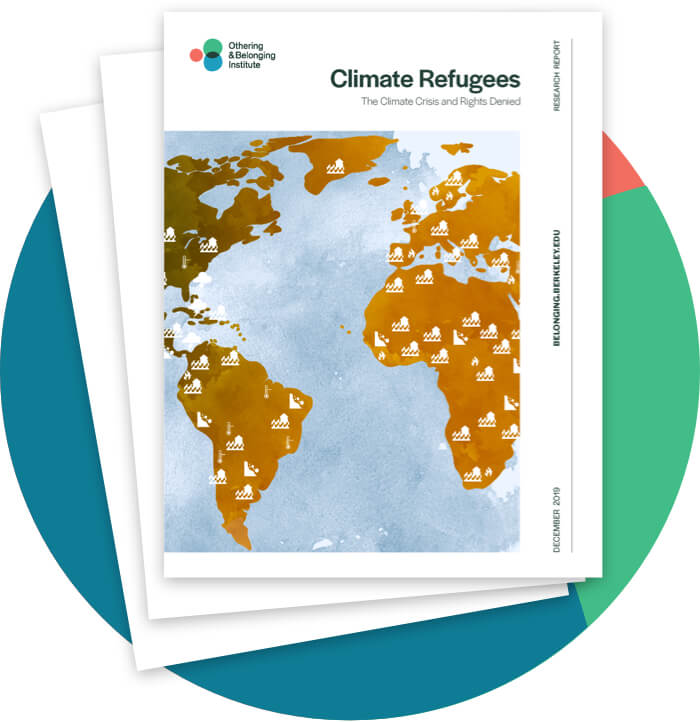France
Introduction to France
France is a northwestern European country that has long held political and cultural influence, with former colonies spanning every corner of the globe. Its population of approximately 68 million (2023)1 is approximately 82% urban,2 with 19% of the population residing in Paris alone. France has a temperate climate, characterized by generally mild winters and warm summers, with regional variations such as the Mediterranean climate in the south and the oceanic climate in the northwest. Notable geographic features include the Alps, the Pyrenees, and extensive coastlines along the Atlantic Ocean and Mediterranean Sea. Short- and long-term climate impacts include heatwaves, flooding, droughts, and severe storms. With the 7th largest economy in the world,3 France is a high-income country with key sectors including chemical, machinery, and automobile industries, which employ approximately 19% of the population4 and contribute significantly to its GDP of $3 trillion5 and per capita GDP of around $45,000.6 The vast majority of the French population, over 75%, is employed within the service industry, including tourism.7 The political economy of France is characterized by a strong social welfare system and active participation in the European Union, and the French have long sought international leadership by way of climate action. France's wealth and global influence, following in part from its history of colonization, affords the country a broad range of resources and information to best respond to intensifying climate conditions.
Mapping Major Climate Events and Climate-Induced Displacement
While the threat of climate impacts is present, France is well-positioned to adapt. The ND-GAIN Index ranks France as the 172nd most vulnerable country and the 19th most ready country in the world of 185 nations.8 Despite this, France remains susceptible to rising temperatures that elevate the risk of heatwaves, increased frequency and intensity of rainfall and flooding, and rising sea levels. Recent events include the heatwave of 2003, which claimed the lives of 15,000 (predominantly elderly and disabled) people,9 severe floods in 2016,10 2020,11 and 202312 which left thousands displaced and without electricity, and recurring droughts affecting agriculture and sparking mass civil unrest.13 In France, while the number of internally displaced people due to climate events is not often reported and cited as in other countries, the impact on local communities and infrastructure is significant. Between 2008 and 2023, France experienced 141 disaster events that included dry and wet landmass movements, wildfires, floods, and storms, with increased frequency and intensity in recent years. Between 2008 and 2015, there were 16,290 reported displacements attributed to such events, and between 2016 and 2023, this number rose to over 103,000.14 The vulnerability of key sectors risks compounding such impacts. For example, without urgent action to reduce emissions, estimates state that temperatures in France could increase by as much as 2.1°C by 2050, agricultural droughts will last 35% longer, and heatwaves will occur 80% more often and last 1,461% longer than they do today.15 These risks are compounded by other factors including include urbanization, aging infrastructure, and the lack of effective disaster response mechanisms.
Mapping the Costs of the Climate Crisis
The economic costs of climate impacts are substantial, with major event-specific costs, particularly due to damages to infrastructure, agriculture, and health sectors. Initial estimates indicate that the floods that occurred on November 2023 in the Hauts-de-France region (Northern France), could result in insured losses amounting to € 550 million (602 million USD).16 French insurance companies have estimated that natural disasters cost the industry 3.5 billion euros on average per year between 2017-2021.17 Heightened health risks, particularly for vulnerable populations, and increased pressure on public services also create significant indirect costs. Between 2015 and 2019, the economic impact of selected health effects of heat waves amounts to €25.5 billion ($27.1 billion USD), mainly in mortality (€23.2 billion, 25.3 billion USD), minor restricted activity days (€2.3 billion, $2.49 billion USD), and morbidity (€0.031 billion, $0.033 billion USD).18 Maintaining current carbon emission rates, by 2050, GDP losses in France could escalate to as much as €30 billion ($32.7 billion USD). Restricting the temperature increase to 2°C could reduce the cost of climate impacts in France from 5.82% of its GDP in 2100 under a high emissions scenario to 1.81%.19
Mapping Resilience and Mitigation Pathways
France has committed to key international climate agreements, including the Paris Agreement, and has implemented national policies such as the French Climate Plan. France has committed to reducing its greenhouse gas emissions by 40% (from 1990 levels) by 2030. With the adoption of the Energy and Climate Law in 2019, France aims to achieve carbon neutrality by 2050, reducing emissions by more than sixfold compared to 1990.20 However, the Intergovernmental Panel on Climate Change (IPCC) has noted that these policies are conservative, and more immediate, radical action is necessary to meet 2030 goals.21 More localized climate action has also taken root across France. In 2007, the City of Paris launched an ambitious Climate Action Plan (Plan Climat), resulting in a 20% reduction in its carbon footprint and a 25% decrease in local GHG emissions between 2004 and 2018. By 2050, Paris aims to achieve zero local emissions, and reduce its carbon footprint by 80% compared to 2004.22 Such local efforts have also created social innovation, one of note being Assises de la transition écologique, forums where citizens, experts, and officials collaborate to design policy solutions, which has been utilized in the city of Orléans since 2021.23 Further, France is one of the first countries to write ecocide into its legal framework by penalizing severe and intentional environmental damage and by endorsing efforts to recognize ecocide as an international crime. This dual approach reflects France's commitment to combating environmental crimes both domestically and internationally.24
Necessary Changes
While the French government has demonstrated the national will necessary to build climate resistance through its commitments to global climate frameworks and future emission goals, its actions on the international stage stand in opposition to their words at home. In 2024, France, Italy, and Germany stood in opposition to the European Union's plan to introduce an international law needed to hold companies accountable for human rights abuses and environmental harm within their supply chains.25 The dissent from these three countries undermines efforts to enforce corporate responsibility and protect human rights and the environment throughout the EU, action that is desperately needed to foster lasting climate justice. It is also critical to note that the extent of France’s tangible climate action has been limited, and this apathy has been legally recognized. In 2021, a French court convicted the French state for failing to address the climate crisis effectively in a historic ruling that helped to establish a legal precedent for holding governments accountable for their climate actions.26 Since this landmark case, the French government has done little to respond to such critiques. French progress relies on heeding warnings such as this, and utilizing their influence and resources to respond to their citizens effectively, and upholding international standards that sustain and expand climate resilience for all.
Citations
- 1"Population, Total - France." The World Bank. Accessed July 16, 2024. https://data.worldbank.org/indicator/SP.POP.TOTL?locations=FR.
- 2"Urban Population (% of Total Population) - France." The World Bank. Accessed July 16, 2024. https://data.worldbank.org/indicator/SP.URB.TOTL.IN.ZS?locations=FR&ski….
- 3"The Top 10 Economies in the World." U.S. News & World Report. Accessed July 16, 2024. https://www.usnews.com/news/best-countries/articles/the-top-10-economie….
- 4"France: Economy." Global Edge. Accessed July 16, 2024. https://globaledge.msu.edu/countries/france/economy.
- 5"GDP (Current US$) - France." The World Bank. Accessed July 16, 2024. https://data.worldbank.org/indicator/NY.GDP.MKTP.CD?locations=FR.
- 6"GDP per Capita (Current US$) - France." The World Bank. Accessed July 16, 2024. https://data.worldbank.org/indicator/NY.GDP.PCAP.CD?locations=FR.
- 7"Employment Level in Services as a Share of Total Employment in France from 2000 to 2022." Statista. Accessed July 16, 2024. https://www.statista.com/statistics/595386/services-employment-as-share….
- 8"France." Notre Dame Global Adaptation Initiative (ND-GAIN). Accessed July 16, 2024. https://gain-new.crc.nd.edu/country/france#:~:text=The%20low%20vulnerab….
- 9"Early Warning Systems: Heatwaves." United Nations International Strategy for Disaster Reduction (UNISDR). Accessed July 16, 2024. https://www.unisdr.org/files/1145_ewheatwave.en.pdf.
- 10"Why France is Taking a Lead Role in Climate Change." BBC News. Accessed July 16, 2024. https://www.bbc.com/news/world-europe-42856634.
- 11"Photos: Flooding in Southeastern France." The Atlantic. Accessed July 16, 2024. https://www.theatlantic.com/photo/2020/10/photos-flooding-southeastern-….
- 12"France - Floods in North, Pas-de-Calais January 2024." FloodList. Accessed July 16, 2024. https://floodlist.com/europe/france-floods-north-pas-de-calais-january-….
- 13"France’s Looming Water Crisis." Foreign Policy. Accessed July 16, 2024. https://foreignpolicy.com/2023/09/25/france-water-crisis-climate-enviro….
- 14"France." Internal Displacement Monitoring Centre. Accessed July 16, 2024. https://www.internal-displacement.org/countries/france/.
- 15"France." G20 Climate Risks. Accessed July 16, 2024. https://www.g20climaterisks.org/france/.
- 16"Flooding in Hauts-de-France Region: Loss Estimates." Atlas Magazine. Accessed July 16, 2024. https://www.atlas-mag.net/en/natural-disasters/flooding-in-hauts-de-fra….
- 17"Cost of Natural Disasters in France Soars to Highest in 23 Years." Radio France Internationale (RFI). Accessed July 16, 2024. https://www.rfi.fr/en/france/20230127-cost-of-natural-disasters-in-fran….
- 18"Economic Burden of Heat-Related Illnesses in France Between 2015 and 2019." PubMed. Accessed July 16, 2024. https://pubmed.ncbi.nlm.nih.gov/34304326/#:~:text=Results%3A%20Between%…(€0.031%20billion).
- 19"France." G20 Climate Risks. Accessed July 16, 2024. https://www.g20climaterisks.org/france/.
- 20"French Policies to Tackle Climate Change." Ministry of Ecological Transition. Accessed July 16, 2024. https://www.statistiques.developpement-durable.gouv.fr/edition-numeriqu….
- 21"The Government’s Response to the Climate Crisis Is Far From Enough." Le Monde. Accessed July 16, 2024. https://www.lemonde.fr/en/environment/article/2022/07/17/the-government….
- 22"City of Paris: Carbon Neutral by 2050 for a Fair, Inclusive and Resilient Transition." United Nations Framework Convention on Climate Change (UNFCCC). Accessed July 16, 2024. https://unfccc.int/climate-action/un-global-climate-action-awards/clima….
- 23"A Novel Approach to Local Climate Action in France." Carnegie Endowment for International Peace. Accessed July 16, 2024. https://carnegieendowment.org/research/2021/04/a-novel-approach-to-loca….
- 24"France Writes Ecocide into Law in Two Ways." Stop Ecocide. Accessed July 16, 2024. https://www.stopecocide.earth/press-releases-summary/france-writes-ecoc….
- 25"France, Italy, and Germany Threaten EU Plan to Introduce Supply Chain Law." Human Rights Watch. Accessed July 16, 2024. https://www.hrw.org/news/2024/03/06/france-italy-and-germany-threaten-e….
- 26"Court Convicts French State for Failure to Address Climate Crisis." The Guardian. Accessed July 16, 2024. https://www.theguardian.com/environment/2021/feb/03/court-convicts-fren….


